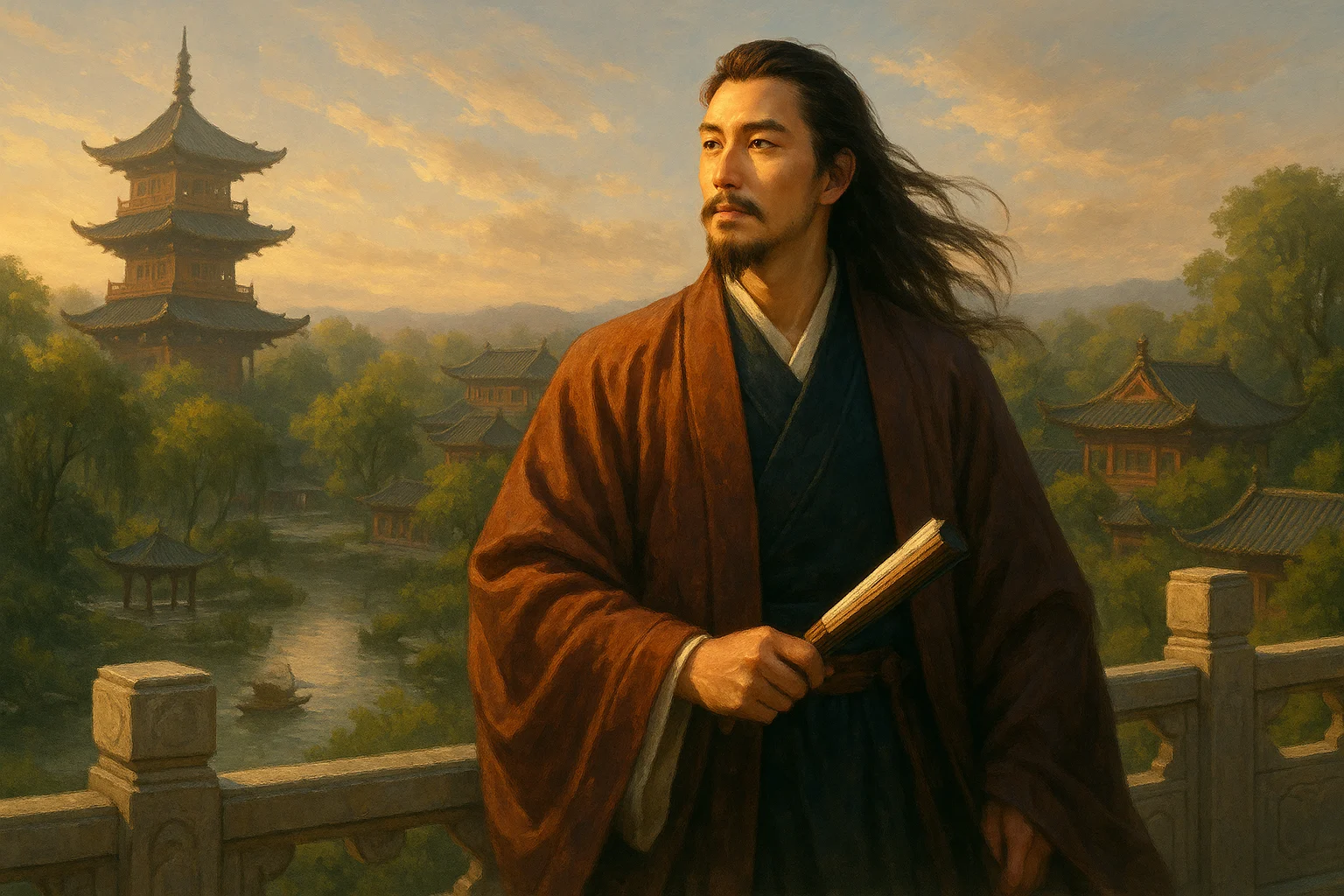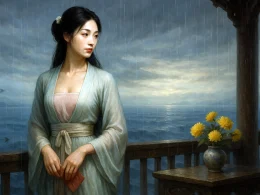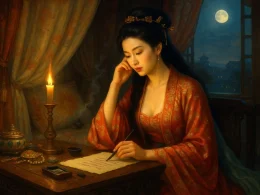Cicadas steep willows in darkening jade,
Lotuses blush with sunset's fiery grade.
Thirty-six spring ponds mirror southern scenes—
White-haired, I fish those reflected dreams.
Original Poem
「题西太一宫壁二首 · 其一」
王安石
柳叶鸣蜩绿暗,荷花落日红酣。
三十六陂春水,白头想见江南。
Interpretation
This poem was composed in 1068 (the first year of the Xining era under Emperor Shenzong of the Northern Song Dynasty), when Wang Anshi revisited the West Taiyi Palace shortly after assuming office in the capital. In his middle age, with his political career still uncertain and his reform policies yet to be implemented, the vicissitudes of life and the separation from loved ones had already become deeply personal pains. The poem expresses the homesickness and personal reflections triggered by the scenery before him, serving as a subtle and profound wall inscription that conveys emotion through landscape.
First Couplet: "柳叶鸣蜩绿暗,荷花落日红酣。"
Liǔ yè míng tiáo lǜ àn, hé huā luò rì hóng hān.
Willow leaves dense, cicadas drone in emerald shade,
lotus blossoms drunk with crimson in the setting sun.
This couplet depicts midsummer scenery, blending visual and auditory elements with vibrant colors. "Emerald shade" (绿暗) captures the lush density of willow foliage, while "cicadas drone" (鸣蜩) marks the season's zenith, creating an atmosphere of luxuriant yet slightly languid vitality. "Drunk with crimson" (红酣) personifies the lotuses as beauties flushed with wine under the oblique sunlight, both vivid and emotionally resonant. Together, these images form a rich yet tranquil summer evening tableau, foreshadowing the emotional shift to come.
Second Couplet: "三十六陂春水,白头想见江南。"
Sān shí liù bēi chūn shuǐ, bái tóu xiǎng jiàn jiāng nán.
Thirty-six marshes of springwater spread before me—
white-haired now, I long for Jiangnan.
Here the poet transitions from scenery to sentiment. "Thirty-six marshes" (三十六陂), a place name from Jinling, traditionally symbolizes Jiangnan's watery landscapes. Though set in summer, the poet recalls Jiangnan's spring waters, leading to the homesick lament "white-haired now, I long for Jiangnan." "White-haired" (白头) reflects his advancing age, while "long for" (想见) conveys tender yearning—a desire to see what remains unseen, to return where return is difficult. This couplet expresses not just nostalgia for home, but also for loved ones, the past, and his own former self, layering complex, profound emotion.
Holistic Appreciation
Through its depiction of summer beauty at the West Taiyi Palace, this poem evokes the poet's boundless longing for his Jiangnan homeland and deep reminiscence of bygone years. The opening couplet employs intense colors and sensory richness to express emotion through scenery, while the closing lines convey melancholic homesickness. Phrases like "emerald shade" and "drunk with crimson" vividly portray midsummer's dazzling intensity, while "white-haired, I long for Jiangnan" delivers the weight of aging and profound yearning through deceptively simple language.
Though merely a four-line wall inscription, this compact work achieves remarkable complexity: temporal interplay (present summer scenes versus remembered spring waters), spatial shifts (capital ponds versus Jiangnan marshes), and emotional turns (scenic delight versus homesick sorrow). Blending landscape depiction with life reflections, it demonstrates Wang Anshi's artistic mastery and emotional depth during middle age.
Artistic Merits
- Emotion within scenery, combining movement and stillness:
The poet uses serene summer landscapes to trigger profound nostalgia, seamlessly merging scene and sentiment where vibrant tranquility contains undercurrents of sorrow. - Vivid color contrasts:
"Emerald shade" paired with "drunk crimson" creates striking visual opposition that both characterizes the scenery and provides emotional subtext, showcasing Wang's chromatic sophistication and psychological insight. - Channeling homesickness through historic sites:
"Thirty-six marshes" functions as both actual scenery and symbolic Jiangnan, elevating the poem's conceptual layers by fusing personal emotion with cultural geography. - Concise yet profound language:
Using plain but potent diction within a balanced structure, the poem achieves far-reaching artistic conception. The closing line "white-haired, I long for Jiangnan" delivers tremendous emotional force through apparent simplicity.
Insights
This compact work embodies deep sentiment and time-tempered wisdom. It reminds us that middle age often brings poignant reflections on the past when encountering familiar landscapes. During life's hurried journey, each return to old haunts and each recognition of changing scenery may awaken our deepest yearnings for bygone days, loved ones, and roots. This homesick attachment and silent sigh before time's passage perhaps constitute life's most authentic emotions—where Wang Anshi transforms personal nostalgia into universal resonance through poetic distillation.
About the Poet

Wang Anshi (王安石 1021 - 1086), a native of Linchuan in Jiangxi, was an outstanding statesman, writer, and thinker of the Northern Song Dynasty, counted among the "Eight Great Prose Masters of the Tang and Song Dynasties." His poetic achievements were particularly profound—his early works, filled with heroic language, revealed the ambition of a reformer. Though his ci poetry was few in number, it pioneered new realms of historical reflection. His poetry and prose combined intellectual depth with artistic value, and the over 1,500 works preserved in The Collected Works of Linchuan stand as a monumental testament to literary innovation in Song Dynasty literature.












